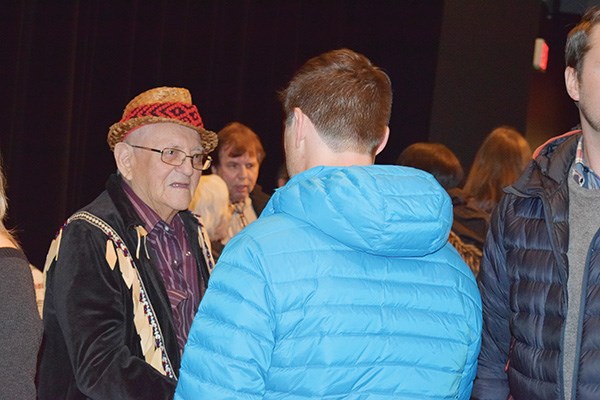It was an emotional two hours of sharing, listening and learning.
The Evening Celebrating Reconciliation held Monday at the Eagle Eye Theatre included heartfelt speeches by Karen Joseph of Reconciliation Canada, Mayor Patricia Heintzman and Squamish Nation elders and leaders.
Speakers shared what reconciliation meant to them or how the abuses of the past have impacted their lives.
Squamish Nation elder Bob Baker (Kiyowil) said he was taken from his Brackendale home when he was a young boy to St. Michael’s Indian Residential School in Alert Bay, which was built by the Department of Indian Affairs and run by the Anglican Church.
“They just grabbed me, and they put me in a car and they put me on a boat, and they shipped me out,” he said.
He stayed at the residential school, off the northeast coast of Vancouver Island far from his family, for eight years.
“That was really rough for me,” he said. “I was abused, sexually abused, mentally.”
When he left the school after Grade 7, he was angry but didn’t know what to do with his anger. “My brain was just killed, I felt so bad,” he said. For a time, he pushed the troubling memories away and worked as a fisherman, but in time, the memories and the pain flooded back.
“I never cried in my life, didn’t matter how much a guy would hit me around, I never cried,” he said. “But that time when I took a look at that [Truth and Reconciliation] video they brought out, I couldn’t hold it in, I cried. I was looking at myself, what happened to those poor kids.”
Baker said he became an alcoholic because of what he endured. He still has a hard time dealing with the memories, but he wants to share what happened to him to make things better for the next generations, “make a better place for them in this world.”
After the speeches, audience members could ask questions or share their thoughts.
Jackie Williams (Tiaoutenaat) stood and spoke about the difficulties of being raised by two parents who had been in residential school.
“You are getting a lighter version of what happened,” she told the audience. “I grew up seeing physical and sexual abuse.”
Williams said she had to learn how to parent her children. “I didn’t want to hit my child,” she said.
Williams said the truth and reconciliation process is “just the beginning” of the collective healing that needs to be done to right the injustices done to First Nations.
“We don’t feel like we are part of your schools… your community,” she said. “We are a peaceful, loving, caring people.”
At the close of the event, everyone held hands for a prayer led by Squamish Nation elder Shirley Toman (Humteya), and Karen Joseph of Reconciliation Canada asked the audience to take the emotion of the night and turn it into action.
“We live in a society that has some unfortunate truths,” she said. “What is some small action you can take on reconciliation?”
The Squamish Public Library was the host for the Squamish Nation and Reconciliation Canada event. Attendees were encouraged to pledge to read the Summary of the Final Report of the TRC, available online, at the Squamish Library or at Totem Hall.
The Truth and Reconciliation Committee’s final report, released in December, includes accounts from the former students of what First Nations youth endured in residential schools. The report also includes 10 guiding principles and steps that all Canadians can take to improve the lives of First Nations people.



